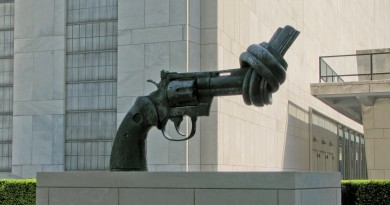Peaceful Pluralism and Nonkilling Policy, by Jennie S. Bev
[Op-ed by Jennie S. Bev republished from The Jakarta Post]
The world of politics is based on violence, within which killing — as a form of violence — is a major component in gaining and maintaining power.
Throughout the history of political philosophy, from Plato’s Republic, Aristotle’s Politics, Machiavelli’s The Prince, Hobbes’s Leviathan, Locke’s Two Treaties of Government, Rousseau’s The Social Contract, Marx and Engels’ The Communist Manifesto, to Weber’s “Politics as a Vocation,” all agreed that killing is a necessary form of force used in a power struggle, if not as a last resort.
Weber even defined “a modern state” as a “human community that claims the monopoly use of physical force within a given territory.” He also added: “He who seeks the salvation of the soul, of his own and that of others, should not seek it along the avenue of politics, for the quite different tasks of politics can only be solved by violence.”
In a nutshell, according to Weber, only those with the heart to perform violent acts are suitable for the world of politics, while the soft-hearted ones should choose a different path.
But we have come to a point where we can no longer tolerate violence and killing. Even in the name of politics.
In today’s violent atmosphere, the premise of “violence and killing are the world of politics’ inseparable elements” must be balanced with a nonkilling paradigm. The term “nonkilling”, which was recently popularized by Prof. Glenn Paige of the University of Hawaii and a founder of the Center for Global Nonkilling, is to specify an important aspect of non-violence, so as to distinguish it from Gandhi’s non-violence movement (ahimsa).
Among all violent methods, killing occupies the apex of the pyramid as the most notorious and having the most impact. Thus, nonkilling is a natural antidote, even though its concept is oftentimes considered unthinkable, esoteric, and undoable.
In Indonesia, minor conflicts can be blown up exponentially to serve specific political agendas whenever needed. Proper recognition of pluralism and multiculturalism as an integral part of Indonesian culture that cannot be disconnected from other elements should be realized. It is required in the light of a proper shift toward a nonkilling policy.
Culture itself is a concrete and bounded by a world of beliefs and practices. And it is common knowledge that in Indonesia, which can be regarded as a “cultural” element, that minorities are preferred to assimilate into the mainstream majority. While it comes with pros and cons, we should be aware of the consequences of such a mindset. At an extreme level, it may translate to killing.
The umbrella paradigm is simple: all policies should be based upon the understanding that any use of force on people that can translate to violence and killing is unacceptable, thus should be banned.
For instance, the use of military power in Papua is unacceptable as it is unnecessary and inhumane.
With nonkilling as the ultimate goal, the underlying principle must be carefully weighed upon many possible choices, among which is “survival through cooperation.” In an experiment at Tulane University, it was proved that a rat-killing cat and its prey, the rat, could be trained to eat side-by-side from the same saucer. It might sound drastic, using this method to teach human beings and groups how to live in harmony, but if these two natural enemies can make it work, so can we.
Next, contrary to the political scientists’ belief that the world of politics is violent and thus killings are a natural phenomenon, human beings are not killers by nature. Statistically speaking, throughout history, the number of those who are killed outnumbered the killers.
In short, there are only a few killers in society who kill fellow humans. With this logic, we should focus on what the majority has been doing — or not doing — in this respect, which is not killing.
Interestingly enough, some societies are more peaceful than others. In such peaceful societies, the people adopt a strong sense of peaceful self. Among them is Tanah Toraja, South Sulawesi, which can be used as a case study for further peace and nonkilling studies in Indonesia.
Killing itself can be seen from multiple levels of internalization, from philosophical and societal concepts, psychological permission, to individual enactment.
The notion that killing is a solution or even a natural phenomenon in dealing with conflict should not be entertained, even within hypothetical discourses. A gradual shift to diplomacy and other nonkilling alternatives and non-violent methods should be socialized and implemented early on.
In conclusion, peaceful pluralism can be achieved with a nonkilling policy and vice versa. And for this, revolutionary concepts and conduct must be realized from the normative, factual and theoretical to the applied educational perspectives. After all, remember, humanity was created out of love for togetherness, not for hatred.
Rabindranath Tagore expressed it well: “Men are cruel, but Man is kind.”




